
THE WHOLE HISTORY OF MY LIFE
marcus pinn
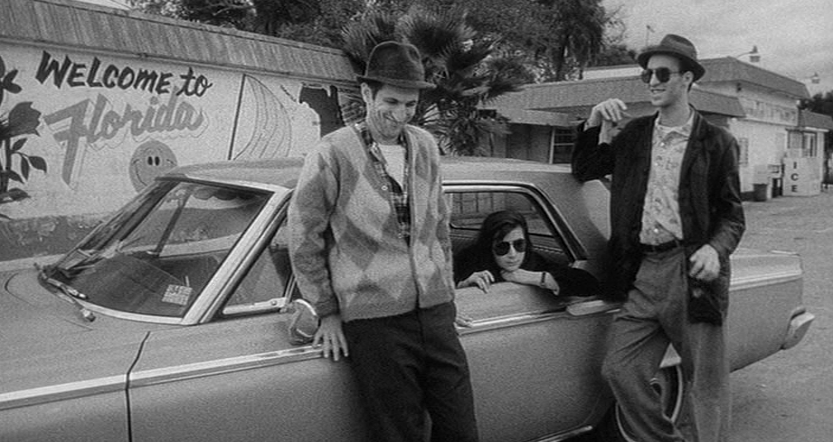
STRANGER THAN PARADISE (page 2)
In Part Two of The Whole History of My Life, I talked about how I usually find my way to older filmmakers through the works of the younger filmmakers they influenced. Had it not been for Video To Go, who knows when I would have discovered the films of German New Wave directors like Werner Herzog, Wim Wenders and Volker Schlöndorff, whose work caused me to branch out even further in to the world of cinema. In high school, I used to rent Harmony Korine's Gummo a lot. Like...a lot. I would get together with my friends to watch it, but I'd also watch it by myself. I rented that movie so much that it got to a point where one of the clerks at Video To Go wouldn't rent it to me anymore because nobody else was getting to see it. But based off of my love for Gummo, he recommended that I check out Werner Herzog's Even Dwarfs Started Small (one of Korine's all-time favorite films), which eventually led me to the rest of Herzog's filmography, then eventually to filmmakers like Wenders and Schlöndorff. It was this type of awesome customer service that I tried to mimic when I worked at Tommy K's Video. Honestly, I was that video store clerk who followed customers around the store to talk about movies and make random recommendations even when I could clearly see they didn't want to be bothered.
I was a regular at Video To Go all throughout Jr. High and High School, but I didn't discover Stranger Than Paradise until the summer of 2001, before my junior year of college while I was home on summer break.* While perusing the video store looking for something to rent on a random summer day, I saw that black & white pre-Criterion MGM release DVD cover for Stranger Than Paradise and thought to myself, "Is that the parking lot attendant from Ferris Bueller's Day Off?" Little did I know that this movie would soon become one of my all-time favorites. To this day, Stranger Than Paradise stands as my greatest blind rental. I knew nothing about it and no one ever recommended it to me. I remember being confused at first because that was definitely Richard Edson on the cover, but the black & white stills on the back of the DVD looked so old and dated. "Was this an older movie?" I thought. "Did Richard Edson just age well between filming this movie in the 70's and Ferris Bueller's Day Off in the mid-80's?" In reality, Stranger Than Paradise and Ferris Bueller's Day Off where only made two years apart from each other. I know that sounds strange but that's how genuinely dated Stranger Than Paradise looked to me. When you look at certain isolated shots like John Lurie standing alone in his apartment, or the early scenes of Eva walking through downtown manhattan, the film looks like it could have been made in the mid 1960's just as much as the early 80's. The characters in the film are dressed like beatnik hipsters from the late 50's, yet the story takes place during a time in New York City when everyone downtown was dressed like a punk rocker, no-waver, or a b-boy. If you knew nothing about NYC in the early 80's and saw Stranger Than Paradise, you'd have no idea that a random collection of figures like John Zorn, Fab 5 Freddy, Sonic Youth and Sid Vicious were all roaming the same streets where the first part of Jarmusch's film is set.
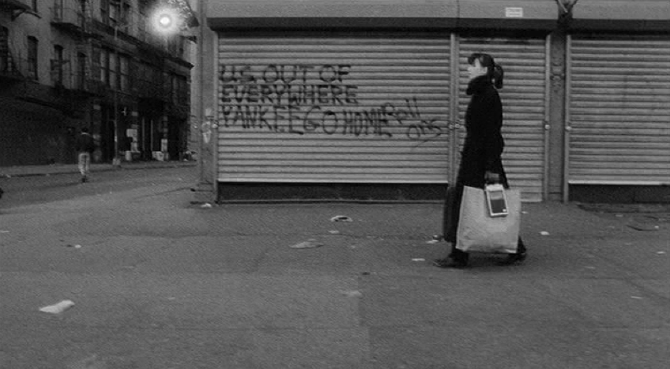
And as a testament to how diverse of a person Jim Jarmusch is, he's connected to each of the aforementioned people (Fab 5, Zorn, Vicious, Sonic Youth) either directly or through just one person. In Stranger Than Paradise, we get appearances from Rammellzzee (legendary graffiti artist, rapper, friend of Fab 5 Freddy and hip-hop's first weirdo), Rockets Redglare (notorious downtown NYC figure, stand-up comedian and former bodyguard for Sid Vicious) and two of the three co-stars, John Lurie and Richard Edson, were well-known musicians at the time: Lurie was a fixture in the No-Wave/experimental Jazz scene that John Zorn pioneered and Edson was the original drummer for Sonic Youth. I've always been mesmerized by early 80's New York City because everything and everyone in the "alternative arts" seemed to mix with one another, and a lot of my favorite music came from that scene. These days when you see artists from different worlds collaborating with each other, it seems a little forced. But in the early 80's, seeing Bill Rice share the screen with Fab 5 Freddy (Wild Style) or Jean Michel-Basquiat in a candid photo with Rammellzzee all felt natural and organic, because the hip-hop scene, the no-wave/punk scene and the modern art scene were all outcasts, to a certain degree, of bigger scenes that rejected them. So they all found each other in downtown Manhattan, which was the only place they could perform or express their art to an audience. A lot of people consider Downtown 81 to be the official movie time capsule of that particular period, but I give that title to Stranger Than Paradise.
By the time I discovered Jim Jarmusch's sophomore feature, I had actually seen Dead Man and Ghost Dog but didn't make the correlation between the three films because I wasn't as director-oriented as I am now. And had I known the same guy responsible for Dead Man and Ghost Dog (two films I initially disliked in my teens) was responsible for Stranger, I would have probably passed on it. Naturally, my opinions on Dead Man and Ghost Dog have changed considerably over the years (especially Ghost Dog), but Stranger Than Paradise was different. I loved it right away. I loved it so much that I immediately watched it again after my first viewing. 13 years later, I still turn to it on a regular basis.
Stranger Than Paradise is the story of Willie (John Lurie), a bored hipster coasting through life, jaded with his current existence in New York City. At the start of the film, Willie's younger Hungarian-born cousin Eva (Ester Balint) comes to stay with him for a little over a week before eventually settling down with her Hungarian mom, Willie's aunt, in Cleveland (Jarmusch's home state). At first, Willie and Eva lightly butt heads: Willie tries to teach his stubborn cousin, who he sees as an inconvenience, about American things like football and tv dinners, and Eva's presence in Willie's home is a reminder of his Hungarian heritage that he tries to downplay for some reason. Early on in the story we learn that Willie isn't the native New Yorker that we assumed he was. Instead we learn he was born in Hungary but is ashamed of his heritage (whenever anyone in the film speaks to him in Hungarian, he quickly requests that they communicate in English).
Eventually Willie and Eva form a bond and learn to get along. Their bond turns out to be so strong that when Eva leaves, Willie legitimately misses her and decides to take a road trip with his best and presumably only friend Eddie (Edson), to visit her in Cleveland. After arriving in the heart of winter, they become bored fairly quickly and the three of them decide to go too Florida for the hell of it. Once they get to the Sunshine State, tensions rise between the three protagonists and Jarmusch leaves us with a beautifully cryptic ending that, in my opinion, serves as a comment on heritage and the idea of "going home."
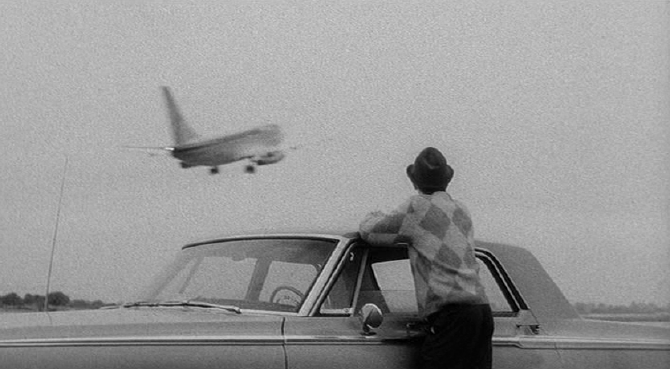
Sure there's a basic plot to Stranger Than Paradise, but at the same time not much happens. It is a basic complaint of many Jim Jarmusch detractors, namely Pink Smoke contributor Paul Cooney, that his films are "boring."** But Stranger Than Paradise is about bored characters, so the tone of the film should be (and is) boring. It's intentional that not much happens. Willie, Eddie and Eva deliver their lines in that typical Jarmusch deadpan style, their movements are somewhat lazy, and they seem uninterested no matter their surroundings. But strangley enough these are characters you find yourself caring about, even if they seem to not care about much themselves.
This is also a road movie. The story takes us from Manhattan to Florida with a pit stop in Cleveland. Hollywood will try to have most audiences believe that road trips are fun action-packed adventures like in Road Trip, Easy Rider or Thelma & Louise. But anyone who has actually taken a fairly long road trip knows how boring they can get. Sure you might meet an interesting character along the way or run into a mildly funny situation, but for the most part it's just a whole lot of driving. Even when you have someone or a group of people to take the trip with, there's still going to be long stretches of that trip where no one talks and you're just bored. Jarmusch captures this realism very well. On more than one occassion in Stranger Than Paradise, there are scenes of our main characters driving along the highway not saying anything to each other. And what's funny is that these scenes are set up in a way where you think someone is going to say something to break the silence but Jarmusch just cuts to the next scene without any dialogue.
I recently took a road trip with my best friend and his wife's precocious 9-year-old sister from Chicago to Augusta. Although it was nice to spend an extended period of time with him (I don't see him that often these days), there were long portions of that drive that were painfully boring and I just wanted it to end. I once drove from Hampton, Virginia to Cincinnati, Ohio by myself - once I reached the Kentucky state line I found myself questioning why I decided to do this stupid drive alone. But there's also something kinda great about road trips. You get to see random parts of the country that you normally don't.
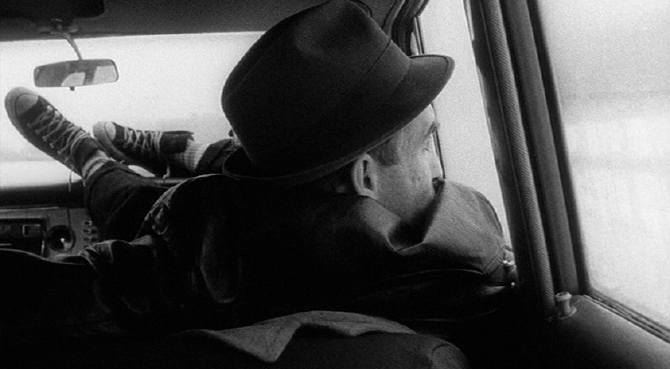
Stranger's "boring" tone draws heavily from Wim Wenders, specifically his own road movies like Alice in the Cities and Kings of the Road. Stranger, like Wenders' two films, is a modern-era black & white movie with minimal dialogue and a somewhat aimless vibe. All three movies have a plot, but it's not the most important thing. The Wenders influence makes a lot of sense because, like I mentioned in the beginning, he actually played a part in making Stranger Than Paradise what it is. Prior to the feature length version, it was just a short film (the first third of Stranger Than Paradise was shot two years earlier than the rest of the film). Jarmusch already had a reputation in Europe since the success of his debut Permanent Vacation (1980). After showing what was just initially a short film version of Stranger Than Paradise at various European film festivals, Wenders saw and took a liking to it and offered to give Jim film to expand it in to the feature-length version that we now know.
Some critics and film scholars mark Rainer Werner Fassbinder's death in 1982, along with his final film Querelle, as the end of the German New Wave, but I like to think that film movement slowly faded away on a more positive note between a crucial five-year period bookended by Volker Schlöndorff's Cannes/Oscar award-winning The Tin Drum from 1979 and Wender's Cannes-winning PARIS, TEXAS from 1984. I also like to think that Wenders passed the torch to Jarmusch, who went on to indirectly influence a new generation of American independent films and filmmakers. I mean, is it any mystery that following the release of Stranger Than Paradise black & white film suddenly became cool in American independent film for the next decade? Mala Noche, Border Radio, She's Gotta Have It, Swoon, Poison, Clerks, In the Soup, Kafka, etc.***
It's almost like the German New Wave planted its seed in the soil of American cinema before it died out.
But that's not to say Jim Jarmusch wasn't influenced by plenty of filmmakers (besides Wenders) himself...
Nothing is original. Steal from anywhere that resonates with inspiration or fuels your imagination. Devour old films, new films, music, books, paintings, photographs, poems, dreams, random conversations, architecture, bridges, street signs, trees, clouds, bodies of water, light and shadows. Select only things to steal from that speak directly to your soul. If you do this, your work (and theft) will be authentic. Authenticity is invaluable; originality is non-existent. And don't bother concealing your thievery - celebrate it if you feel like it. In any case, always remember what Jean-Luc Godard said: It's not where you take things from, it’s where you take them to. – Jim Jarmusch [MovieMaker Magazine, January 22, 2004]
He even makes some obvious references to his favorite films and filmmakers in Stranger Than Paradise...
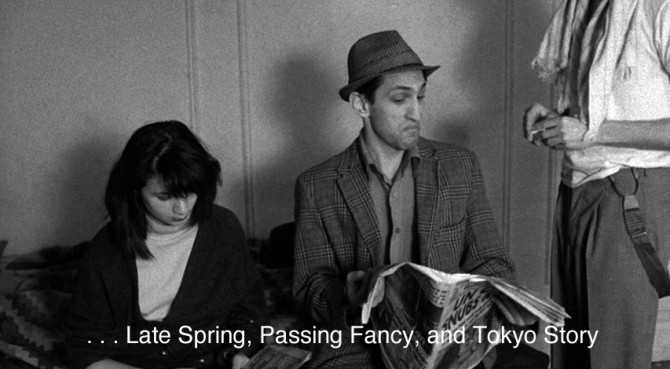
Putting aside the influence Stranger Than Paradise had on cinema and the legacy it left behind,**** the film is just vintage Jarmusch. Plain and simple. It's a perfect example of his style and the first thing I think of when his name comes up. Sure it’s "boring," but it's also extremly charming and quirky in its own unique way. Some would argue that Down by Law or Mystery Train are his greatest films, and they'd have a legitimate case as both of those are close to perfect as well, but Stranger is at the top of his filmography for me. I almost don't even want people to be introduced to his more popular/star-powered work like Dead Man (Johnny Depp) or Broken Flowers (Bill Murray) until they watch and appreciate Stranger Than Paradise first.
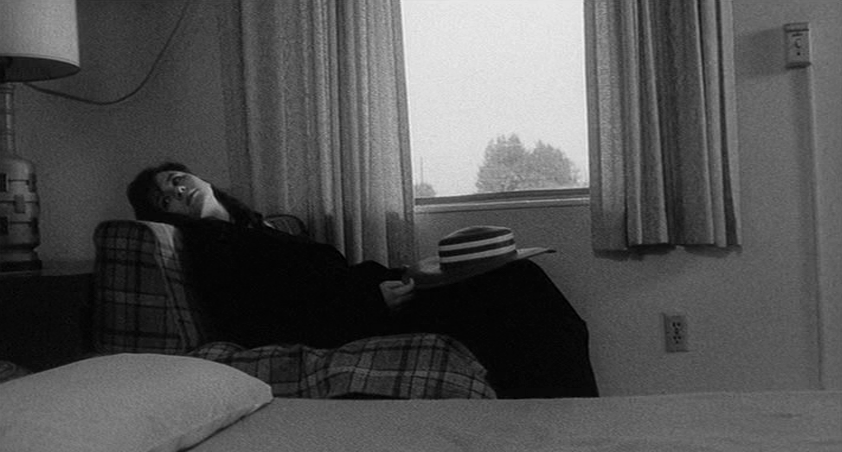
* I'd like the record to show that although I did sit around and watch a lot of movies while growing up, I was also a fairly active kid. I was co-captain of the track & field team my junior and senior year, I Djed and had a radio show on a local college radio station all through high school, wrote for my school newspaper and was vice president of a minority students organization at my high school as well.
** Literally minutes into meeting Paul Cooney for the first time, he let me know how much he hated Jim Jarmusch.
*** Not to say Jarmusch "invented" black & white movies or that Gus Van Sant, Allison Anders, Spike Lee, Tom Kalin and the rest of the bunch tried to copy him, but it is interesting to see how black & film made such a sudden comeback in American independent cinema following Stranger's release
**** Stranger Than Paradise has been preserved by The United States National Film Registry for being "culturally, historically & aesthetically significant."
RELATED ARTICLES
<<Previous Page 1 2 Next Page>>
home about contact us featured writings years in review film productions
All rights reserved The Pink Smoke © 2014